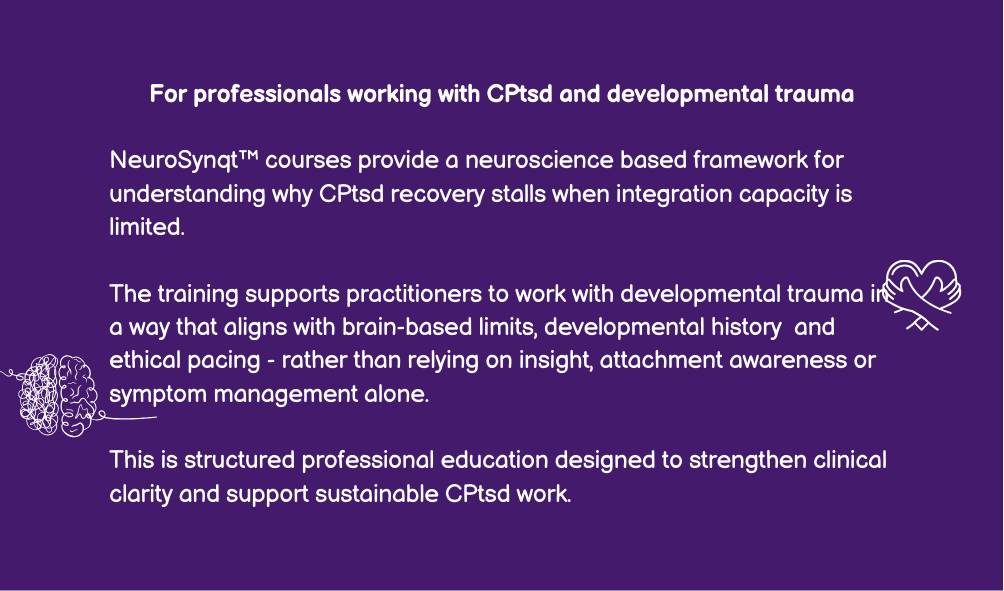For Professionals working with adults impacted by childhood developmental trauma

The NeuroSynqt™ Clinical Developmental Integration Model
CPtsd is not a behavioural issue.
It is a brain integration injury.
NeuroSynqt™ trains professionals to work at the level recovery actually requires.
Insight does not produce integration. Cognitive understanding of trauma does not reorganise developmental integration or restore missing capacity.
Attachment awareness does not automatically translate into relational capacity.
Recognising the pattern is not the same as having access to new relational responses.
Regulation strategies can stabilise internal states without repairing disrupted integration pathways.
When integration capacity is limited, progress plateaus. This occurs regardless of practitioner skill, training depth, or therapeutic intent.
Sustainable change requires integration that aligns with both developmental history and present capacity.

How NeuroSynqt™ Supports Brain Integration
NeuroSynqt™ is a clinical developmental integration model for working with adults impacted by developmental trauma and CPtsd.
It supports practitioners to identify where integration stalled developmentally, rather than treating symptoms, behaviours, or attachment patterns as primary intervention targets.
It supports practitioners to identify where integration stalled developmentally, rather than treating symptoms, behaviours, or attachment patterns as the primary target.
NeuroSynqt™ helps professionals to:
distinguish insight from developmental integration capacity
-
recognise survival-based organisation rather than skill deficits
-
separate attachment awareness from relational access
-
align pacing and therapeutic demand with current integration limits
The NeuroSynqt™ Clinical Developmental Integration Model complements existing therapeutic approaches and does not operate as a standalone model. It provides the clinical structure required to guide individual sequencing, pacing, and ethical decision-making in CPtsd work.
Course Structure and
Learning Focus
NeuroSynqt™ courses are structured to reflect how integration develops over time in adults impacted by developmental trauma.
Across the series, practitioners build:
-
a neuroscience, experiential, integration framework for CPtsd
-
clearer clinical reasoning about capacity, pacing and readiness
-
stronger differentiation between state based survival organisation and developmental limitation
-
clinical orientation for working with dissociative states and identity disruption without mislabelling the present-day self
Resources and templates are provided to support learning integration and client homework where appropriate.
Optional professional development and business resources may be included in selected units.
Clinical Developmental Integration Model
Provides a structured clinical model for understanding how developmental trauma organises integration across the lifespan.
Supports practitioners to identify capacity limits, recognise survival-based organisation, and work in alignment with developmental reality.
Clinical Orientation and Case Mapping Tools
Includes structured tools that support clinical reasoning, case formulation, and ethical pacing in CPtsd work.
Resources are designed to support practitioner clarity and, where appropriate, structured client work aligned with integration capacity.
Clinical Application Within Existing Practice
Supports practitioners to integrate NeuroSynqt™ frameworks into existing practice without altering scope, modality, or professional identity.
Focuses on applying integration-led reasoning across diverse clinical settings while maintaining ethical and professional standards.
Advanced Reference and Consolidation Materials
Provides advanced reference materials that deepen understanding of developmental trauma, integration, and identity continuity.
Designed to support consolidation and professional reflection rather than technique acquisition.
Linda Meredith
Passionate, Innovative, and Dedicated to
Complex Trauma Recovery
An advanced clinical developmental integration model for mental health professionals
Courses
NeuroSynqt™ Complex Trauma Certification Program
An advanced certification program for professionals working with adults who have experienced childhood trauma, grounded in clinical developmental integration and capacity-based sequencing.
Designed for counsellors and mental health professionals seeking a structured framework for CPtsd work, with clear guidance on integration readiness, pacing, and ethical sequencing.
NeuroSynqt™ prioritises integration first. This supports practitioners to work beyond symptom management and into capacity-based recovery pathways that match developmental history.
Structured CPtsd recovery materials designed to support integration between sessions.

